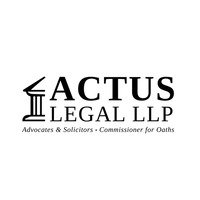Best Drug Crime Lawyers in Chinatown
Share your needs with us, get contacted by law firms.
Free. Takes 2 min.
List of the best lawyers in Chinatown, Singapore
About Drug Crime Law in Chinatown, Singapore
Drug crimes in Chinatown, Singapore, come under the purview of the Misuse of Drugs Act (MDA). Singapore has rather strict laws when it comes to drug possession and trafficking, with severe penalties that can include life imprisonment and even the death penalty in certain cases. The Downtown Core, including the Chinatown, is an area with close scrutiny due to its cultural and touristic significance.
Why You May Need a Lawyer
Understanding and navigating the complex legal environment surrounding drug crimes in Singapore is challenging. If you are accused of a drug offence, you may need a defence lawyer to protect your rights and ensure you get a fair trial. They can assist with everything from examination of the prosecution's evidence to representation in court to ensure that your rights are upheld.
Local Laws Overview
Singapore's Misuse of Drugs Act is multi-layered and extensive. It criminalises the production, importation, exportation, trafficking, possession, and consumption of certain substances. Penalties under this act vary depending on the drug involved, the quantity, and the involvement of the accused. All narcotic substances including cannabis, heroin, 'Ice', and ecstasy, among others, are considered illegal. The authorities have the ability to conduct random checks and drug tests, refusal of which can also lead to imprisonment.
Frequently Asked Questions
What is the mandatory death penalty in drug offences?
The mandatory death penalty in Singapore is imposed in cases of certain drug trafficking offences. This includes situations where an individual is found in possession of drugs exceeding a certain quantity.
Can anyone be subjected to a drug test?
The Central Narcotics Bureau (CNB) in Singapore has the authority to test any individual they suspect of drug consumption.
What happens if one refuses to take a drug test in Singapore?
If an individual refuses to submit to a drug test when required by CNB officers, they can be treated as having tested positive for drug use and may face penalties including imprisonment.
What are the penalties for drug consumption in Singapore?
The penalties for drug consumption in Singapore can be severe. These can range from imprisonment up to 10 years to a fine of up to $20 000, or both.
What is considered drug trafficking in Singapore?
Drug trafficking in Singapore includes not only selling, but also giving, transporting, sending, delivering or distributing controlled drugs.
Additional Resources
Seeking assistance from Central Narcotics Bureau (CNB) and the Subordinate Courts of Singapore can provide good information regarding drug laws and penalties. NGOs like the Singapore Anti-Narcotics Association can also provide help in situations involving drug offences.
Next Steps
If you are in need of legal help for a drug crime in Chinatown, the first step is to engage a professional lawyer who specializes in drug offences. Ensure all your dealings are with your counsel present and cooperate fully with enforcement agencies to ensure your rights are respected and protected.
Lawzana helps you find the best lawyers and law firms in Chinatown through a curated and pre-screened list of qualified legal professionals. Our platform offers rankings and detailed profiles of attorneys and law firms, allowing you to compare based on practice areas, including Drug Crime, experience, and client feedback.
Each profile includes a description of the firm's areas of practice, client reviews, team members and partners, year of establishment, spoken languages, office locations, contact information, social media presence, and any published articles or resources. Most firms on our platform speak English and are experienced in both local and international legal matters.
Get a quote from top-rated law firms in Chinatown, Singapore — quickly, securely, and without unnecessary hassle.
Disclaimer:
The information provided on this page is for general informational purposes only and does not constitute legal advice. While we strive to ensure the accuracy and relevance of the content, legal information may change over time, and interpretations of the law can vary. You should always consult with a qualified legal professional for advice specific to your situation.
We disclaim all liability for actions taken or not taken based on the content of this page. If you believe any information is incorrect or outdated, please contact us, and we will review and update it where appropriate.










